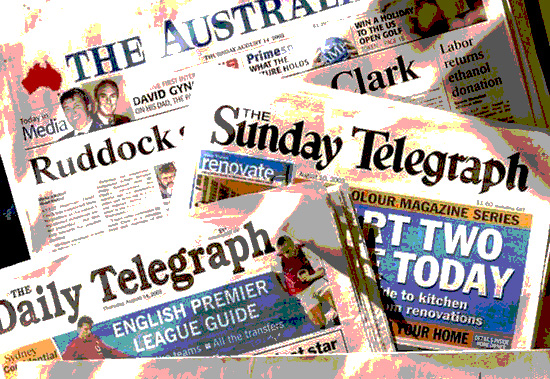
OPINION: The Australian’s associate editor, Cameron Stewart, has argued that the immediate endorsement of the proposal for a statutory media regulator by some media academics was indicative of the irrelevance, ineptitude and Leftist bias of journalism educators generally.
Like any piece of attack journalism, it used carefully selected truths and sources to develop a positional and very political assault on the journalism education sector and the former (and current) journalists who teach, research and publish there. It is an old and flawed argument.
While I disagree with this kind of journalism and its use by a leading masthead, I think it presents a unique lesson on why Finkelstein’s core proposal for a News Media Council with statutory powers to order corrections and apologies is so wrong.
Journalism educators have quite rightly taken umbrage at the article in the Weekend Australian and, as I blog, are composing a unified response to the attack.
This is the right course of action – to first seek redress and a right of reply from the publisher of the offending article.
If the identified individuals felt strongly enough about the imputations it contained about them – and if they had the resources available to them – they might take legal advice and perhaps sue for defamation.
For reasons I have outlined previously in Crikey, most principled journalists and editors do not resort to this measure because they value the free exchange of ideas too highly and do not wish to set such an example for others.
'Unfairness' complaint
If the aggrieved journalism educators are dissatisfied with The Australian’s response, under the current regime they might instead make a complaint to the Australian Press Council over any unfairness, bias or inaccuracies in Stewart’s article they feel breaches that body’s Statement of Principles.
If the council is unable to mediate a resolution, this would then be adjudicated by its complaints panel of (mainly) non-affiliated citizens and journalists, chaired by legal academic Julian Disney (or its vice-chair).
If the council found The Australian had indeed been unfair, biased or inaccurate, or had unfairly refused to run a right of reply, the council might decide to uphold the complaint and demand The Australian run its adjudication in full. As that newspaper’s parent company, News Limited, is an abiding member of the council, it is likely that adjudication would be published. If not, it would at least appear on the council’s website and among its regular releases on adjudications.
As outlined in several submissions to the Finkelstein inquiry, and noted at length in its final report, these processes could do with considerable improvement.
But consider the course of events under the proposed statutory body detailed in the report.
The early steps in the process would be fairly similar to the council’s system, although the proposal would have the whole matter conducted "on the papers", without legal representation, within a few days.
The "independent’"panel would be chaired by a retired judge or eminent lawyer appointed by the government of the day, and would have a different constituency with fewer media members.
Statutory powers
However, rather than being told to publish the decision, The Australian might well be ordered under statutory powers to publish a correction, apology, retraction or right of reply.
The Australian might feel so strongly about its claims that it refuses to do so. After all, to "correct", "apologise" or "retract" something over which you hold the heartfelt belief is true, however misguided, is itself an affront to those who hold such beliefs so strongly. Indeed, to be forced to apologise when you do not mean it is to be compelled to state a falsity.
The Australian’s refusal would be the disobedience of a statutory body and, under the Finkelstein proposals, would trigger a charge of contempt to be adjudicated by a court of law, with the usual penalties for contempt available to a judge – a fine or a jail term. (The report flags some opportunity to appeal the council’s decision within that process – with all the accompanying legal costs for both sides.)
Some of my journalism education colleagues might be feeling so angry about the article that they might want Stewart or his editor-in-chief Chris Mitchell fined or jailed over this story. I suspect, however, that most would share my disdain for the possibility of such an outcome in a free democratic society which has no protection for free expression in its Constitution or Bill of Rights.
However, no matter how misleading and misplaced we may feel Cameron Stewart’s piece may be, there is no disputing the fact that some journalism academics immediately supported the proposal for a statutory regulator with such powers and potential consequences.
The ground seems to be shifting somewhat on that front. One of those attacked, Johan Lidberg from Monash University, initially (cautiously) supported the core recommendation but now states “A statutory based media regulator is highly problematic” (email to journalism educators, 10.3.12).
UTS Professor Wendy Bacon, and Swinburne’s Margaret Simons, have each written strong and well documented endorsements of Finkelstein’s criticisms of the mainstream media’s ineffective self-regulation, but have stopped short of endorsing the statutory enforcement option.
And so they should.
Wind clock back
Wind the clock back to late 2010, and we had this very editor-in-chief of The Australian, Chris Mitchell, threatening to sue journalism educator Julie Posetti for defamation over her tweets covering comments made by a former staffer from The Australian at a Journalism Education Association conference – the now infamous #twitdef episode.
Allow me a little licence with the scenario because the Finkelstein reforms might not cover tweets and the actual case was contentious partly because of its twitter brevity.
But let’s say a UTS student had reported the comments in that university’s student newspaper, and Mitchell had not sued, but had instead complained to the proposed "independent" News Media Council about the article, on the same grounds of unfairness, inaccuracy and bias.
And what if, like Posetti, the student newspaper had stood by its article and refused to publish a retraction, correction or apology?
Well – assuming the newspaper met the definitional criteria of the new body as "news media" which are far from clear – then we might well be facing the prospect of a journalism student or editor being jailed for what would otherwise may have been a defamation damages payment, and for which a defamation defence might well have applied.
Hypotheticals I know, but you need them to flesh out the potential implications of a new media regulator that would instantly convert ethical codes into punishable laws.
Only by using examples close to home can we understand the intransigence of both complainants and publishers. An analysis of both APC and ACMA complaints over recent years will reveal complaints over political views – a disproportionate number related to the Israel-Palestine dispute – where opinions are held so strongly that some proponents would face jail rather than retract or apologise.
Proposal defence
One of the academics informing the Finkelstein inquiry, Denis Muller, has written a defence of the proposal on smh.com.au. It is worth quoting his final two paragraphs in full:
“It is proposed that the new council would have power to order corrections, apologies and rights of reply, and say where they should be published. The question of fairness arises here: if wrongful harm was done in a page one story, why shouldn’t at least the first two or three paragraphs of the remedial material also appear on page one? If a sanction was ignored or refused, the council would have the right to apply to a court for an order of compliance. The media company concerned could argue its case. Only if it lost and still refused to comply would it become legally liable — not to the council but to the court for contempt.
“Ideally, the media would do all this themselves: make a legally binding arrangement to set up an accountability body, properly funded, with transparent processes, credible sanctions and agreement to comply. History tells us it is unlikely, but maybe this report will act like a cattle prod on their collective hide.”
I might be wrong, but I read that final sentence as a hint that the whole statutory regulator proposal might be a trumped up threat to the mainstream media to get their regulatory house in order – not unlike David Calcutt’s 1990 warning to the British tabloids that they were "drinking at the last chance saloon".
That may well be the case, and if so it seems to be already having an effect, with publishers meeting last week to discuss a revamp of the Press Council.
But if it is true, what a shame that Finkelstein should send such a message of endorsement of statutory media regulation to the regimes throughout the world who have already adopted it.
© Mark Pearson 2012. Republished with permission from the author's Journlaw blog. Original article includes links.
Author's disclaimer: While I write about media law and ethics, nothing here should be construed as legal advice. I am an academic, not a lawyer. My only advice is that you consult a lawyer before taking any legal risks.
OTHER VIEWS
Why the market can't ensure a free press - Wendy Bacon, New Matilda
Attack by The Australian supports case against 'self-regulation' - Mark Pearson, Journlaw
Finkelstein report: Media’s great divide - Cameron Stewart, The Australian
Finkelstein inquiry report cause for 'cautious optimism' - Andrea Carson, The Conversation
Why Finkelstein is not Judge Dread - Alan Kohler, Business Spectator
Media inquiry ignores value of diversity - Jason Wilson, The Drum



